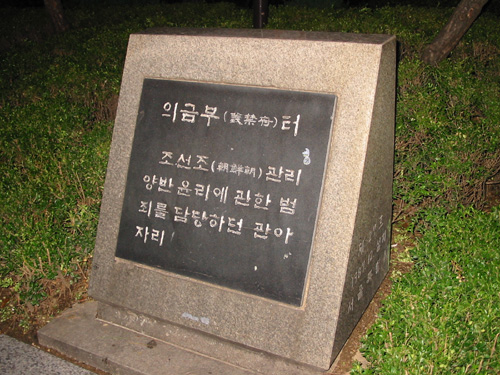Uigeumbu on:
[Wikipedia]
[Google]
[Amazon]
 Uigeumbu (in
Uigeumbu (in
 Uigeumbu (in
Uigeumbu (in Hangul
The Korean alphabet, known as Hangul, . Hangul may also be written as following South Korea's standard Romanization. ( ) in South Korea and Chosŏn'gŭl in North Korea, is the modern official writing system for the Korean language. The let ...
:의금부, in Hanja
Hanja (Hangul: ; Hanja: , ), alternatively known as Hancha, are Chinese characters () used in the writing of Korean. Hanja was used as early as the Gojoseon period, the first ever Korean kingdom.
(, ) refers to Sino-Korean vocabulary, wh ...
: 義禁府) refers to the judiciary organ during Goryeo
Goryeo (; ) was a Korean kingdom founded in 918, during a time of national division called the Later Three Kingdoms period, that unified and ruled the Korean Peninsula until 1392. Goryeo achieved what has been called a "true national unificati ...
and Joseon dynasty
Joseon (; ; Middle Korean: 됴ᇢ〯션〮 Dyǒw syéon or 됴ᇢ〯션〯 Dyǒw syěon), officially the Great Joseon (; ), was the last dynastic kingdom of Korea, lasting just over 500 years. It was founded by Yi Seong-gye in July 1392 and re ...
in Korea. Another names are Geum-o or Wangbu (The ministry of the King). The structure was in charge of questioning the case of treason or interrogating felons. Uigeumbu takes the equivalent position of today's Supreme Court
A supreme court is the highest court within the hierarchy of courts in most legal jurisdictions. Other descriptions for such courts include court of last resort, apex court, and high (or final) court of appeal. Broadly speaking, the decisions of ...
.
History
Uigeumbu roots from Soonmaso established during the reign of Chungnyeol of Goryeo. During Goryeo, the organ took largely broad responsibility of legal charges. However, early structure of Joseon followed former organ to make dominance of judicial power, which was resulted to take over the work of judicial police only. Working with Saheonbu, the organ dealt with the lese majesty or legal execution. Generally, the responsibility covers the crimes of bureaucrats, foreigners or treason or the incidents seriously against theConfucianism
Confucianism, also known as Ruism or Ru classicism, is a system of thought and behavior originating in ancient China. Variously described as tradition, a philosophy, a religion, a humanistic or rationalistic religion, a way of governing, or ...
. It also worked as the special court in emergency case.
The system of the organ was changed several times depending on the code in the current time. In 1414, the institution came to possess full independence. Basically, 4 subjects held the concurrent position. According to official code of Gyeongguk daejeon
''Gyeongguk daejeon'' (translated as the State Code or the National Code) is a complete code of law that comprises all the laws, customs and decrees released since the late Goryeo Dynasty to the early Joseon Dynasty. Sorted according to the releva ...
, about 200 officials coped with the judicial matters.
In 1894, Gojong of the Korean Empire converted the name to Uigeum-sa and then further started to hand down the decisions, only the case happened in Hanyang Hanyang may refer to:
China
*Hanyang District (漢陽區, 汉阳区, ''Hànyáng Qū''), Wuhan, Hubei
:*Hanyang Arsenal (漢陽兵工廠), founded in 1891 as one of the oldest modern arsenals in Chinese history
:*Hanyang 88 (漢陽八八式步槍), ...
, current Seoul. Following Gabo reform
The Gabo Reform, also known as the Kabo Reform, describes a series of sweeping reforms suggested to the government of Korea, beginning in 1894 and ending in 1896 during the reign of Gojong of Korea in response to the Donghak Peasant Revolution. ...
, the office was named the High Court (고등재판소) and then the Pyeongriwon (평리원; 平理院) in 1899.
See also
*Joseon dynasty
Joseon (; ; Middle Korean: 됴ᇢ〯션〮 Dyǒw syéon or 됴ᇢ〯션〯 Dyǒw syěon), officially the Great Joseon (; ), was the last dynastic kingdom of Korea, lasting just over 500 years. It was founded by Yi Seong-gye in July 1392 and re ...
*Seungjeongwon
The ''Seungjeongwon'' was the Royal Secretariat during the Joseon dynasty of Korea (1392–1910) in charge of receiving and delivering the king's order. The office was also called ''Jeongwon'', ''Huwon'', ''Eundae'', or ''Daeeonsa''. According to t ...
References
{{reflist Politics of Korea Joseon dynasty